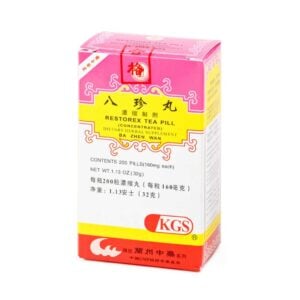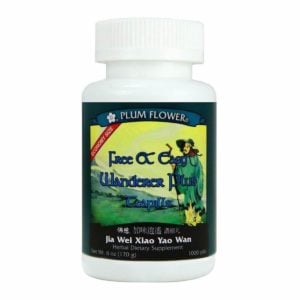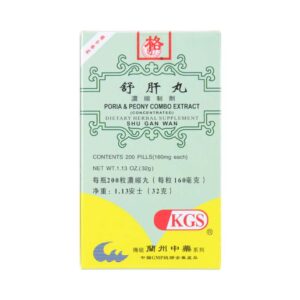Your cart is currently empty!
Does waking up each day feeling energized, free from pain, and ready to embrace life to the fullest feel like an impossible dream?
Unfortunately, for millions of people living with fibromyalgia, even simple daily tasks like walking, cooking, or commuting can be overwhelming exhausting, and even painful.
Chinese herbs for fibromyalgia offer a glimmer of hope. These all-natural holistic formulas have been used for centuries to help relieve muscle pain like fibromyalgia (as well as fatigue, insomnia, and brain fog) at the source.
Read on to find out how you can restore your body’s balance and enjoy more fibromyalgia-free days through the right Chinese herbal formula for you.
What is Fibromyalgia?
Fibromyalgia isn’t just pain – it’s a complex and often misunderstood chronic health condition that can affect nearly every aspect of daily life. While it shares some similarities with other pain conditions, like arthritis, it’s important to note that fibromyalgia is unique in a few ways.
Arthritis primarily involves inflammation and damage to the joints and surrounding tissues. It is characterized by aggravating joint pain, swelling, and stiffness.
Fibromyalgia, on the other hand, is considered a musculoskeletal disorder that primarily affects the muscles, tendons, and soft tissues. It does not cause joint damage, and its hallmark symptom is widespread chronic pain and tenderness throughout the body.
However, fibromyalgia and arthritis can often coexist, especially when there is a common underlying root cause (such as inflammation, dampness, or stress).
What Causes Fibromyalgia?
The exact cause of fibromyalgia isn’t fully understood, and there is no single known cause. In reality, it’s more likely that there are several factors that lead to the development of this condition. Common contributing factors include:
- Genetics
Fibromyalgia tends to run in families, suggesting there may be a genetic component that could increase the risk of developing the condition.
- Physical Trauma or Injury
Physical injuries, surgeries, or infections can trigger the onset of fibromyalgia symptoms in some individuals. This is often referred to as post-traumatic or post-surgical fibromyalgia.
- Stress and Emotional Factors
High levels of stress, anxiety, and emotional trauma are very common in those with fibromyalgia and are thought to play a role in exacerbating fibromyalgia symptoms.
- Sleep Disturbances
Sleep problems, including sleep apnea and insomnia, are common in people with fibromyalgia. Researchers believe there could be a link between sleep issues and fibromyalgia symptoms.
Symptoms of Fibromyalgia
Sometimes, fibromyalgia can be hard to differentiate from other pain conditions. While there are some common symptoms, the intensity, location, and duration of these symptoms usually vary widely from person to person. But, the symptoms below are common in most people who do have fibromyalgia:
- Chronic, widespread pain in the muscles, tendons, and soft tissues throughout the body
- Specific tender points on the body that are painful to touch
- Profound and constant fatigue and reduced stamina
- Difficulty falling asleep or staying asleep, lack of deep sleep
- Reduced focus, loss of memory, and brain fog (also called “fibro fog”)
- Frequent tension headaches or migraines
- Mood disorders like depression and anxiety
- Gastrointestinal symptoms, such as abdominal pain, diarrhea, and constipation, or IBS
- Sensitivity to temperature changes and loud noises
The Western Approach: Conventional Treatments for Fibromyalgia
If you’ve been diagnosed with fibromyalgia, you have probably been given a few conventional treatment options to help manage your symptoms. While these treatments can help keep pain levels manageable, they are primarily focused on symptom relief rather than addressing the root cause of fibromyalgia pain.
Conventional Treatments for Fibromyalgia
Medications for Symptom Management
Medications are often recommended to quiet the symptoms of fibromyalgia:
- Pain Relievers: Over-the-counter or prescription pain medications are often used to alleviate muscle and joint pain associated with fibromyalgia.
- Antidepressants: Certain antidepressants, particularly those in the category of serotonin and norepinephrine reuptake inhibitors (SNRIs), can help manage pain, improve sleep quality, and address the mood imbalances associated with fibromyalgia.
- Anti-seizure Drugs: Medications typically used to treat seizures, such as pregabalin (Lyrica) and gabapentin (Neurontin), can be prescribed to reduce pain and improve sleep.
- Muscle Relaxants: These can be used to alleviate muscle spasms and stiffness.
While these medications can provide relief, they often just mute the symptoms at the surface level; they don’t get to the core reason why you’re experiencing pain or other symptoms. Not to mention, they can come with a range of potential side effects, such as drowsiness, GI issues, weight gain, and dependency.
- Physical Therapy
If you have fibromyalgia, exercising can feel like a daunting task. Physical therapy can help improve muscle strength and flexibility while reducing pain. It often includes exercises, stretches, and other techniques to enhance physical function while getting your symptoms under control.
- Counseling
Counseling or psychotherapy can be beneficial for individuals with fibromyalgia, as it helps address the emotional and psychological aspects of the condition, such as anxiety and depression.
There is no single right way to manage your fibromyalgia pain. But, the good news is that Chinese herbal medicine offers a different approach that pairs well with any current fibromyalgia pain management plan you’re currently on. And, most importantly, it addresses the root causes of your unique experience so you can have more pain-free days.
The Eastern Approach: TCM Treatments for Fibromyalgia
While conventional treatments for fibromyalgia aim to manage symptoms, they typically don’t address the root cause of fibromyalgia pain. Yet, this is where Traditional Chinese Medicine (TCM) shines.
TCM takes a holistic approach to health, focusing on the balance and flow of vital energy (qi) and the body’s natural ability to heal itself. In TCM, fibromyalgia is seen as a disruption of the body’s natural harmony and balance, resulting in the manifestation of specific patterns of imbalance. Treating fibromyalgia with TCM focuses on restoring this balance while minimizing your symptoms naturally.
By identifying and addressing the specific imbalances in your body, Chinese medicine medicine can provide a more comprehensive and sustainable approach to managing fibromyalgia symptoms and keep the condition from progressing.
Let’s explore how TCM views, diagnoses, and treats fibromyalgia.
Patterns of Pain: Diagnosing Fibromyalgia with TCM
At its core, fibromyalgia is associated with the concept of “stagnation” in TCM. This is a condition where the flow of vital energy (qi) and blood in the body is obstructed or blocked.
This stagnation can result in pain, discomfort, and various symptoms. Fibromyalgia is generally considered a condition of both excess and deficiency, as it involves elements of energy blockage and weakness.
However, stagnation can be a complex issue. There are different types of stagnation, and sometimes stagnation itself is not actually the root cause. Getting the best results means knowing what kind of stagnation you are experiencing and using the right herbal medicines to restore healthy flow and balance.
So, which “pattern” of fibromyalgia pain are you experiencing? Here are the key patterns of imbalance that disrupt the flow of qi and blood and cause stagnation and fibromyalgia pain:
- Qi and Blood Stagnation
This pattern is characterized by a lack of proper circulation of qi and blood, leading to pain, muscle stiffness, and tenderness. Individuals with this pattern often experience sharp, stabbing pain.
- Qi and Blood Deficiency
When the body doesn’t have enough qi and blood, it disrupts the smooth flow of vital energy and nourishment to the muscles and tissues. It can also prevent healthy circulation, leading to more dampness and stagnation. This deficiency can lead to a lack of energy, chronic fatigue, and muscle weakness. When it comes to fibromyalgia, these imbalances result in widespread pain and tenderness, as the body struggles to adequately support its musculoskeletal structure. This can also lead to some of the emotional imbalances (such as anxiety and depression) that are common in fibromyalgia.
- Liver Qi Stagnation
In TCM, the liver is associated with the smooth flow of qi in the body. When Liver qi becomes stagnant due to stress or emotional factors, it can result in muscle tension, irritability, and a sensation of fullness or discomfort in the chest or rib cage. Those with liver qi stagnation also tend to struggle with severe stress, irritability, frustration, anxiety, or depression.
- Kidney Qi Deficiency
Weakness in the Kidney system can lead to chronic fatigue, lower back pain, and cold extremities. This pattern of imbalance is often associated with fibromyalgia pain that comes with difficulty sleeping, extreme fatigue, memory loss, and a general lack of vitality.
TCM Treatments for Fibromyalgia
In TCM, treatments for fibromyalgia focus on restoring the body’s natural balance and ability to self-regulate, manage pain, and improve emotional balance. Every treatment is tailored to the individual, but most people will benefit from these TCM therapies:
- Acupuncture
Acupuncture is a cornerstone of TCM and can be highly effective for treating fibromyalgia. By inserting fine needles into specific points on the body, acupuncture helps to unblock qi and blood, reducing pain and promoting relaxation. It can also stimulate the release of endorphins, the body’s natural painkillers.
- Chinese Herbal Medicine
TCM herbal formulas are tailored to the individual’s specific pattern of imbalance. Common herbs used for fibromyalgia include:- Eucommia bark (Du Zhong)
Used for strengthening the lower back and alleviating pain. - Turmeric (Jiang Huang)
Known for its anti-inflammatory properties and pain-relief effects. - Chuan xiong (Ligusticum wallichii)
Used to promote blood circulation and alleviate headaches. - Astragalus root (Huang Qi)
Strengthens the immune system and enhances overall vitality. - Sour jujube seed (Suan Zao Ren)
Suan Zao Ren is used to calm the mind, improve sleep, and alleviate insomnia, which is a common symptom of fibromyalgia. - Dang Gui (Chinese Angelica)
Dang Gui is used to nourish and invigorate the blood, making it beneficial for addressing qi and blood deficiency, one of the common patterns associated with fibromyalgia.
- Eucommia bark (Du Zhong)
- Qigong or Tai Chi
Qigong and Tai Chi are mind-body practices that combine slow, flowing movements with deep breathing and meditation. They offer those with fibromyalgia a way to get gentle exercise without overdoing it and making their pain and fatigue worse. As an added benefit, these exercise therapies improve energy flow (qi), increase energy levels, reduce stress, and enhance overall well-being.
- Dietary Therapy
TCM dietary therapy emphasizes the importance of balanced and nourishing meals. Specific dietary recommendations can vary based on the individual’s pattern of imbalance but often include warm, easily digestible foods, and the avoidance of cold or raw foods, which are believed to impede digestion and circulation. Eating a diet full of anti-inflammatory foods is often recommended to reduce cellular damage in muscles and joints.
The Best Chinese Herbs for Fibromyalgia
Chinese herbal medicine offers a range of herbal formulas that have been used for centuries to address the underlying imbalances that lead to fibromyalgia symptoms. These herbs can help improve circulation, reduce inflammation, alleviate pain, and promote restorative sleep without the side effects associated with many conventional medications.
Chinese Herbs for Fibromyalgia: Move Stagnation
Feeling stressed? Tense? Achey and inflamed all over? Jia Wei Xiao Yao San can help. Jia Wei Xiao Yao Wan is a similar formula to the popular stress relief formula Xiao Yao Wan, but contains added herbs to clear heat and dampness. Heat and dampness in the body can exacerbate pain, inflammation, and stagnation.
If you prefer a tincture over a pill or capsule, try this Bupleurum and Peony tincture version instead.
Shu Gan Wan is a warming formula that contains a combination of herbs like Poria and Peony that help to soothe the liver, alleviate tension, and promote the free flow of qi and blood. By addressing the Liver qi stagnation pattern, Shu Gan Wan can help reduce pain and discomfort, making it a great choice for those whose symptoms are mainly focused on pain and tension.
Chinese Herbs for Fibromyalgia: Build Qi and Blood
-
 Ba Zhen Wan – Restorex Teapill – by Kingsway (KGS) Brand
Starting at $6.99
Add to CartSelect options
This product has multiple variants. The options may be chosen on the product page
Ba Zhen Wan – Restorex Teapill – by Kingsway (KGS) Brand
Starting at $6.99
Add to CartSelect options
This product has multiple variants. The options may be chosen on the product page
Ba Zhen Wan is one of the most commonly used Chinese herbal formulas because it addresses a problem many of us face: low energy. This formula is especially beneficial for individuals with fibromyalgia who primarily experience symptoms of deficiency, fatigue, and “fibro fog.” This formula is designed to strengthen the body’s vital energy (qi) and nourish the blood.
For added warmth and an energy boost, take your daily dose with a cup of warm Energy and Stamina Tea or Stamina Herb Tea.
-
 Suan Zao Ren Tang (Zizyphus Decoction) – Liquid Extract (Tincture)
Starting at $14.00
Add to CartSelect options
This product has multiple variants. The options may be chosen on the product page
Suan Zao Ren Tang (Zizyphus Decoction) – Liquid Extract (Tincture)
Starting at $14.00
Add to CartSelect options
This product has multiple variants. The options may be chosen on the product page
Gui Pi Tang is another helpful formula for those with fibromyalgia who need a boost in both qi and blood deficiency, and experience other symptoms such as anxiety, bloating, and poor digestion. This formula can also help support healthy sleep patterns and general energy levels.
Chinese Herbs for Fibromyalgia: Balance Mood & Restore Sleep
-
 Suan Zao Ren Tang (Zizyphus Decoction) – Liquid Extract (Tincture)
Starting at $14.00
Add to CartSelect options
This product has multiple variants. The options may be chosen on the product page
Suan Zao Ren Tang (Zizyphus Decoction) – Liquid Extract (Tincture)
Starting at $14.00
Add to CartSelect options
This product has multiple variants. The options may be chosen on the product page
This formula features Suan Zao Ren, or sour jujube seed, known for its calming properties. By soothing the mind and promoting restorative sleep, Suan Zao Ren Tang can help you get better sleep so you can wake feeling refreshed and restored, and experience reduced symptoms during the day.
Take this tincture throughout the day to manage anxiety, and one hour before bed with a cup of Sleep & Renew Tea.
Chinese Herbs for Fibromyalgia: What Does the Research Say?
Research on how Chinese herbs work for fibromyalgia is limited, but growing! We now have several studies and clinical trials that show promising results for those looking for natural pain relief. Here are some key findings and insights from the existing research:
- Chinese herbs relieve pain.
Chinese herbal formulas have been shown to effectively reduce pain and tenderness associated with fibromyalgia. Many herbs do this through their anti-inflammatory and pain-relieving properties. - Chinese herbs support quality sleep.
Insomnia and poor sleep quality are common complaints in fibromyalgia. Herbal formulas like Suan Zao Ren Tang, containing Suan Zao Ren (sour jujube seed), have a proven ability to promote restful sleep and improve sleep-related symptoms. - Chinese herbs encourage mood balance.
TCM formulas such as Gui Pi Tang and Jia Wei Xiao Yao Wan have been shown to effectively reduce stress and help address the emotional disturbances often accompanying fibromyalgia, including anxiety and irritability.
Ready to Try Chinese Herbal Medicine for Fibromyalgia Relief?
Living with fibromyalgia isn’t easy, but you don’t have to let fibromyalgia define your life.
With the help of Chinese herbal medicine (tailored to your specific pattern of imbalance) you can find natural and effective solutions for pain relief, improved sleep, emotional well-being, and more.
Embracing the power of Chinese herbs along with therapies like acupuncture, qigong, dietary therapy, and other supportive self-care practices can help you lead a more balanced and pain-free life. Shop these and other holistic formulas for pain and arthritis, fatigue, and emotional balance today!
Table of Contents
- What is Fibromyalgia?
- The Western Approach: Conventional Treatments for Fibromyalgia
- The Eastern Approach: TCM Treatments for Fibromyalgia
- The Best Chinese Herbs for Fibromyalgia
- Ready to Try Chinese Herbal Medicine for Fibromyalgia Relief?
About the Author
Blog Categories
- Adaptogen Articles (7)
- Brain Health Articles (9)
- Chinese Medicine Basics Articles (11)
- Chinese Medicine for Pain Articles (14)
- Chinese Medicine for Pets Articles (3)
- Chinese Medicine for Skin Conditions Articles (6)
- Chinese Medicine Formula Articles (6)
- Chinese Medicine Sleep Articles (4)
- Conditions & Concerns Articles (24)
- Digestive Issues (5)
- Health & Lifestyle Articles (17)
- Heart Health Articles (4)
- In the News (1)
- Medicinal Mushrooms Articles (7)
- Men's Health Articles (4)
- Scholarships (5)
- Weight Loss, Diet & Obesity Articles (5)
- Women's Health Articles (9)
Articles Related To Best Chinese Herbs for Fibromyalgia
-
Joint pain can be a huge burden, especially as we age. One of the most common issues people face as they approach their 50s is what some TCM practitioners call “fifty-year-old-shoulder.” Also known as frozen shoulder or impingement syndrome, this shoulder pain can be extremely aggravating and keep you from doing the tasks and activities…
-
Summertime is here – and it’s the prime season for outdoor activities. Whether you’re exercising outside, playing sports, or just enjoying some time in the sun with friends and family, enjoying the summer and staying active also helps you maintain your best health. But, all that extra exercise can come at a cost. Increased activity…
-
If you’ve ever struggled with joint pain, you know how it can turn even the simplest daily tasks into aggravating challenges. Reaching for an over-the-counter pain reliever is a common first step for many arthritis and joint pain sufferers, but if you’re reading this, you might be curious about natural alternatives. The good news is…
-
No parent wants to see their child in pain. But what can you do when your child develops a chronic pain condition and other treatments just don’t work? If you haven’t considered using Chinese herbs for juvenile arthritis, you may have found your new solution. Childhood pain conditions have been treated successfully with Traditional Chinese…
-
Few of us will get through life without a backache now and then. But what can you do when back pain takes over your hip, buttocks, and leg? You’ve got sciatica – and Chinese herbs can help. Sciatica is a specific type of back and leg pain often caused by arthritis in the spine or…


 Plum Flower – Free and Easy Wanderer Plus (Jia Wei Xiao Yao Wan)
Plum Flower – Free and Easy Wanderer Plus (Jia Wei Xiao Yao Wan) Shu Gan Wan – Poria And Peony Combo Extract – Kingsway (KGS) Brand
Shu Gan Wan – Poria And Peony Combo Extract – Kingsway (KGS) Brand